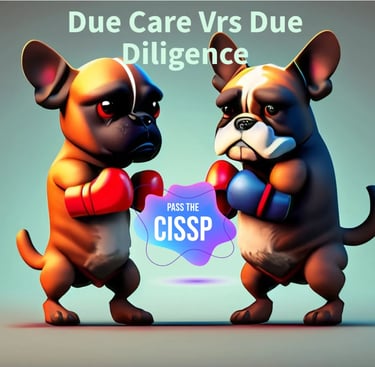Due Care Vrs Due Diligence
CISSP Core Concept
CISSP
Andrea Harston
12/18/20242 min read


Due Dilligence:
Definition: Due diligence refers to the comprehensive research and investigation conducted by a person or entity before entering into an agreement, transaction, or decision.
Application: It is typically performed to assess the risks, opportunities, and other relevant factors associated with a particular action or investment. Due diligence aims to ensure that all pertinent information is gathered and analyzed thoroughly to make informed decisions.
Core Concept: Due diligence involves a systematic and rigorous examination of relevant information, including legal, financial, operational, and other aspects depending on the context. The standard for due diligence is generally higher than that of due care, as it involves actively seeking out information rather than simply exercising caution. The core concept here is making an informed decision. Think Due Diligence “I diligently researched the topic”.
Practical Example: I am going to buy a car, I do my due diligence by researching cars, looking at various reports on safety and cost, researching interest rates and loans. I am collecting the information and analyzing it.
Due Care:
Definition: Due care refers to the degree of caution and attention that a reasonable person would exercise under similar circumstances to avoid harm or risks to others.
Application: It primarily focuses on the actions and decisions of individuals or entities in fulfilling their responsibilities and obligations. This includes taking reasonable steps to prevent foreseeable harm or negative consequences. For example, a company has a duty of care to its employees to provide a safe working environment.
Core Concept: The standard for due care is often based on what a reasonably prudent person would do in similar circumstances. It's a subjective assessment based on what is considered reasonable under the circumstances. The core concept is a reasonable person's compliance and best effort. Due care “I took care to enact it as best I could”.
Practical Example: Due care happens after I purchase the car, things like getting the oil changed, rotating the tires, filling it with gas. I am performing ongoing maintenance that any reasonable person would do. I am not going to go get a paint job on my car, because that exceeds the reasonable expectation of ongoing maintenance.


